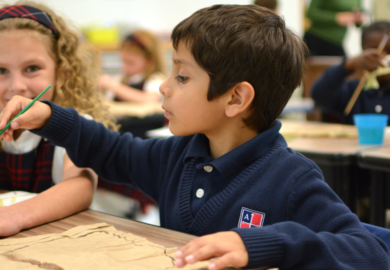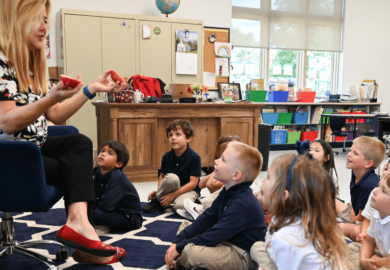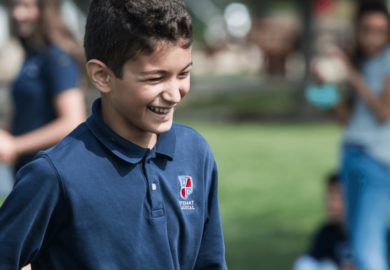James is attending Stanford University where he is pursuing a degree in Classical studies.
These were the questions that stared me down from the whiteboard during my first week of geometry. I would spend the next five days of that class debating with my fellow students the exact definitions of a point and a line. Our teacher spent most of that week listening to our conversation. Occasionally she would guide the discussion of her four students, but really we roamed freely over the questions, debating our many hypotheses for these basic geometric concepts. To some, this could seem wasted time, but to me it was a monumental experience. Each day I found myself eager to enter that classroom on the left side of the hallway to continue our inquiry into the nature of points and lines. I was asked to think in that class at a level I never had before; it was the kind of thinking that takes your entire self, that is tiring and thrilling at the same time. I owe that teacher so much for what she planted in me.
“What is a line? What even is a point? Can lines truly be parallel?”
And I owe others. “Rage, goddess, sing of the rage of Achilles.” These words, translated by the semi-divine Fagels, were my introduction to classical literature. Reading The Iliad was no easy task for the eighth-grade me; the verse was slow reading and the lists of troops were especially tedious. However, each time I finished one of Homer’s twenty-four books, I felt as if I had reached the top of a mountain. I’d look back at the verses to see how far I had climbed, but my teacher would guide me to look at the book as a whole. She would help me to see what I could not yet see on my own: the destructive power of unchecked passion, the inability of heroes to act in the face of fate, and the implied combat of the word against the sword. As we ended The Iliad to move on to The Oresteia, I understood the book in a way I had not understood any other before. Yes, I could tell you the plot and characters of Tom Sawyer and Oliver Twist, but never before had I so clearly seen an author’s message. I felt a connection not just with The Iliad, but with Homer himself, separated as we were by nearly three millennia!

These are just two highlights of the classical education that I received from kindergarten to eighth grade, the education that defines me, that shapes how I think, how I act, how I interact. It was an education in which my teachers didn’t force feed me facts but instead led me to a banquet of knowledge. It’s because of this education that I enjoy discovering recursion in a summer computer science course as much as I enjoy reading The Count of Monte Cristo on a hammock. It’s because of this education that I don’t just study the Latin language but also its literature and culture, history and mythology. And it’s because of this education that I can’t wait for such in-depth classes as Poetry of the Long 18th Century or The Letters of Cicero and Pliny or even Systems Programming and Machine Organization.
I want to continue to be guided by this education, regardless of where I go or what I do. I want to understand the why’s. I want to experience literature and art, from the House of Atreus to the House of Cards. I want to know the world I live in and the people I live with. I want to share what I’m learning with others while also learning from them.
And it’s all because of my classical education. It’s not just my background; it’s my foreground. It’s my future.




